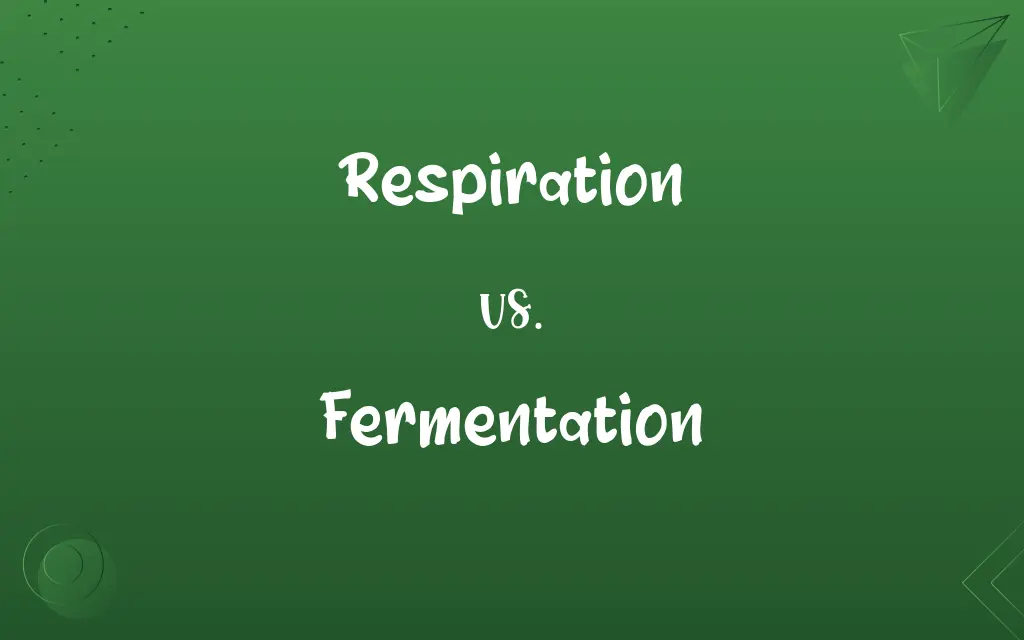Respiration vs. Fermentation: Know the Difference

By Shumaila Saeed || Updated on December 25, 2023
Respiration is a cellular process using oxygen to produce energy, while fermentation occurs without oxygen, producing energy and by-products like alcohol or lactic acid.

Key Differences
Respiration is a biochemical process where cells use oxygen to convert glucose into energy, water, and carbon dioxide. This process is crucial for the survival of most organisms, including humans and animals. Fermentation, in contrast, is an anaerobic process where energy is produced without oxygen, often resulting in by-products like alcohol in yeast or lactic acid in muscle cells.
Shumaila Saeed
Nov 15, 2023
In respiration, energy is produced efficiently, yielding a high amount of ATP (energy currency of cells) per glucose molecule. This process occurs in the mitochondria of eukaryotic cells. Fermentation is less efficient, producing only a small amount of ATP per glucose molecule, and occurs in the cytoplasm of cells.
Shumaila Saeed
Nov 15, 2023
The respiration process is vital for aerobic organisms and is part of their normal metabolic process. It includes stages like glycolysis, the Krebs cycle, and the electron transport chain. Fermentation is a survival strategy for organisms in oxygen-deprived environments and includes types like alcoholic fermentation and lactic acid fermentation.
Shumaila Saeed
Nov 15, 2023
Respiration results in complete breakdown of glucose into water and carbon dioxide, fully extracting the energy potential of glucose. Fermentation leads to the partial breakdown of glucose, producing ethanol and carbon dioxide in yeast (alcoholic fermentation) or lactic acid in muscle cells (lactic acid fermentation).
Shumaila Saeed
Nov 15, 2023
The by-products of respiration are non-toxic (water and carbon dioxide) and are easily eliminated from the body. Fermentation by-products like alcohol can be toxic to the cells if accumulated, and lactic acid can cause muscle fatigue and discomfort.
Shumaila Saeed
Nov 15, 2023
ADVERTISEMENT
Comparison Chart
ADVERTISEMENT
Respiration and Fermentation Definitions
Respiration
The biochemical energy production process in living organisms.
Plant respiration occurs both day and night.
Shumaila Saeed
Nov 15, 2023
Fermentation
A metabolic process that produces chemical changes in organic substrates.
Yogurt is produced through the fermentation of milk.
Shumaila Saeed
Nov 15, 2023
Respiration
The process of breaking down food molecules to generate ATP.
Respiration in cells is vital for maintaining life functions.
Shumaila Saeed
Nov 15, 2023
Fermentation
A biological process by which molecules such as glucose are broken down anaerobically.
Muscle cells resort to fermentation when oxygen is scarce.
Shumaila Saeed
Nov 15, 2023
Respiration
Breathing, the physical act of inhaling oxygen and exhaling carbon dioxide.
Respiration rate increases during exercise.
Shumaila Saeed
Nov 15, 2023
ADVERTISEMENT
Fermentation
The anaerobic conversion of sugar to alcohol or acid.
Fermentation in yeast produces alcohol and carbon dioxide.
Shumaila Saeed
Nov 15, 2023
Respiration
The metabolic process of converting nutrients into energy in the presence of oxygen.
Cellular respiration in humans converts glucose and oxygen into energy.
Shumaila Saeed
Nov 15, 2023
Fermentation
The process of deriving energy from the oxidation of organic compounds.
Fermentation is an ancient technique for preserving food.
Shumaila Saeed
Nov 15, 2023
Respiration
The action or process of inhaling and exhaling; breathing. Also called ventilation.
Shumaila Saeed
Oct 19, 2023
Fermentation
The chemical breakdown of a substance by bacteria, yeast, or other microorganisms.
Fermentation is used in making bread, beer, and wine.
Shumaila Saeed
Nov 15, 2023
Fermentation
Any of a group of chemical reactions induced by microorganisms or enzymes that split complex organic compounds into relatively simple substances, especially the anaerobic conversion of sugar to carbon dioxide and alcohol by yeast.
Shumaila Saeed
Oct 19, 2023
Respiration
The action or process by which an organism without lungs, such as a fish or plant, exchanges gases with its environment.
Shumaila Saeed
Oct 19, 2023
Respiration
The oxidative process occurring within living cells by which the chemical energy of organic molecules is converted in a series of metabolic steps into usable energy in the form of ATP, involving the consumption of oxygen and the production of carbon dioxide and water as byproducts.
Shumaila Saeed
Oct 19, 2023
Fermentation
(biochemistry) Any of many anaerobic biochemical reactions in which an enzyme (or several enzymes produced by a microorganism) catalyses the conversion of one substance into another; especially the conversion (using yeast) of sugars to alcohol or acetic acid with the evolution of carbon dioxide
Shumaila Saeed
Oct 19, 2023
Respiration
Any of various analogous metabolic processes by which certain organisms, such as anaerobic bacteria and some fungi, obtain energy from organic molecules without consuming oxygen.
Shumaila Saeed
Oct 19, 2023
Fermentation
The process of undergoing an effervescent change, as by the action of yeast;
Shumaila Saeed
Oct 19, 2023
Fermentation
A state of agitation or excitement, as of the intellect or the feelings.
It puts the soul to fermentation and activity.
A univesal fermentation of human thought and faith.
Shumaila Saeed
Oct 19, 2023
Respiration
Any similar process in an organism that lacks lungs that exchanges gases with its environment.
Shumaila Saeed
Oct 19, 2023
Fermentation
A process in which an agent causes an organic substance to break down into simpler substances; especially, the anaerobic breakdown of sugar into alcohol
Shumaila Saeed
Oct 19, 2023
Respiration
The process by which cells obtain chemical energy by the consumption of oxygen and the release of carbon dioxide.
Shumaila Saeed
Oct 19, 2023
Fermentation
A state of agitation or turbulent change or development;
The political ferment produced a new leadership
Social unrest
Shumaila Saeed
Oct 19, 2023
Respiration
The act of respiring or breathing again, or catching one's breath.
Shumaila Saeed
Oct 19, 2023
Fermentation
A chemical phenomenon in which an organic molecule splits into simpler substances
Shumaila Saeed
Oct 19, 2023
Respiration
Relief from toil or suffering: rest.
Till the dayAppear of respiration to the justAnd vengeance to the wicked.
Shumaila Saeed
Oct 19, 2023
Respiration
The act of resping or breathing; the act of taking in and giving out air; the aggregate of those processes bu which oxygen is introduced into the system, and carbon dioxide, or carbonic acid, removed.
Shumaila Saeed
Oct 19, 2023
Respiration
The metabolic processes whereby certain organisms obtain energy from organic moelcules; processes that take place in the cells and tissues during which energy is released and carbon dioxide is produced and absorbed by the blood to be transported to the lungs
Shumaila Saeed
Oct 19, 2023
Respiration
A single complete act of breathing in and out;
Thirty respirations per minute
Shumaila Saeed
Oct 19, 2023
Respiration
The bodily process of inhalation and exhalation; the process of taking in oxygen from inhaled air and releasing carbon dioxide by exhalation
Shumaila Saeed
Oct 19, 2023
Respiration
The release of energy from glucose or other organic substances.
Respiration is essential for the energy needs of cells.
Shumaila Saeed
Nov 15, 2023
Repeatedly Asked Queries
Are there different types of respiration?
Yes, primarily aerobic (with oxygen) and anaerobic (without oxygen) respiration.
Shumaila Saeed
Nov 15, 2023
What is respiration?
Respiration is a biological process where cells convert nutrients into energy and waste products.
Shumaila Saeed
Nov 15, 2023
Where does respiration occur in the cell?
It primarily occurs in the mitochondria of eukaryotic cells.
Shumaila Saeed
Nov 15, 2023
Can plants respire?
Yes, plants respire, especially at night, converting sugars into energy.
Shumaila Saeed
Nov 15, 2023
How is respiration regulated?
It's regulated by enzymes and is influenced by the cell's energy needs.
Shumaila Saeed
Nov 15, 2023
Are there different types of fermentation?
Yes, common types include alcoholic fermentation and lactic acid fermentation.
Shumaila Saeed
Nov 15, 2023
What is the main purpose of respiration?
Its main purpose is to release energy from nutrients for cellular activities.
Shumaila Saeed
Nov 15, 2023
Is respiration the same as breathing?
No, breathing is the physical process of inhaling oxygen and exhaling carbon dioxide, whereas respiration is a cellular process.
Shumaila Saeed
Nov 15, 2023
What is aerobic respiration?
Aerobic respiration uses oxygen to break down food molecules for energy.
Shumaila Saeed
Nov 15, 2023
What is anaerobic respiration?
Anaerobic respiration occurs without oxygen, producing energy from food with less efficiency than aerobic respiration.
Shumaila Saeed
Nov 15, 2023
What are the waste products of respiration?
Common waste products include carbon dioxide, water, and energy (ATP).
Shumaila Saeed
Nov 15, 2023
How does fermentation benefit muscles?
Muscle cells use fermentation to generate energy when oxygen levels are low during intense exercise.
Shumaila Saeed
Nov 15, 2023
Can fermentation occur in plants?
Yes, plants can undergo fermentation under anaerobic conditions.
Shumaila Saeed
Nov 15, 2023
How is fermentation related to respiration?
Fermentation is an anaerobic process, similar to anaerobic respiration, but less efficient in energy production.
Shumaila Saeed
Nov 15, 2023
What is fermentation?
Fermentation is a metabolic process that converts sugar to acids, gases, or alcohol in the absence of oxygen.
Shumaila Saeed
Nov 15, 2023
What are common products of fermentation?
Products include ethanol, carbon dioxide (in alcoholic fermentation), and lactic acid (in lactic acid fermentation).
Shumaila Saeed
Nov 15, 2023
What is the role of yeast in fermentation?
Yeast commonly facilitates alcoholic fermentation by converting sugars into alcohol and carbon dioxide.
Shumaila Saeed
Nov 15, 2023
Is fermentation a natural process?
Yes, it's a natural process used by many microorganisms and cells under anaerobic conditions.
Shumaila Saeed
Nov 15, 2023
Where does fermentation occur in a cell?
It occurs in the cytoplasm of both eukaryotic and prokaryotic cells.
Shumaila Saeed
Nov 15, 2023
Is fermentation important in food production?
Yes, it's crucial in making bread, alcohol, yogurt, and other fermented foods.
Shumaila Saeed
Nov 15, 2023
Share this page
Link for your blog / website
HTML
Link to share via messenger
About Author
Written by
Shumaila SaeedShumaila Saeed, an expert content creator with 6 years of experience, specializes in distilling complex topics into easily digestible comparisons, shining a light on the nuances that both inform and educate readers with clarity and accuracy.









































































